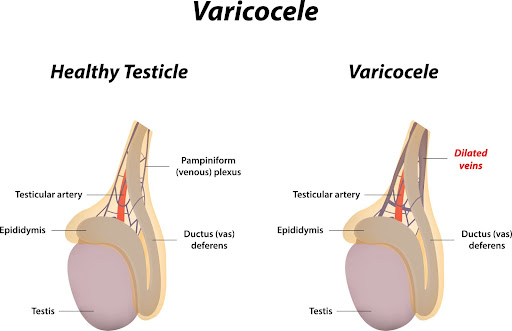Urology
Can Hydrocele Cause Erectile Dysfunction? Exploring the Connection

by admin
15th December 2023
4 minutes read
Introduction
When it comes to matters of male sexual health, there are numerous conditions that can raise concerns. Hydrocele and erectile dysfunction (ED) are two such issues that can impact a man’s quality of life and overall well-being. In this blog, we will delve into the question that has crossed the minds of many: “Can hydrocele cause erectile dysfunction?”
In this blog, we’ll dissect the definition, causes, and symptoms of hydrocele, as well as delve into the world of erectile dysfunction, examining its causes and prevalence. Most importantly, we will investigate the potential link between hydrocele and erectile dysfunction, backed by scientific research and medical insights.
Understanding Hydroceles
Hydroceles are a common medical condition that primarily affects males, characterized by the accumulation of fluid in the scrotum, which is the pouch of skin that holds the testicles. This fluid buildup causes the scrotum to swell, creating a small, fluid-filled sac within it. Hydroceles can be congenital (present at birth) or acquired later in life due to factors such as infection, injury, or other medical conditions affecting the scrotal region. While hydroceles are generally not life-threatening, they can cause discomfort and concerns, especially if they become large or bothersome.
Small, asymptomatic hydroceles may not require treatment and may resolve on their own. For larger or bothersome hydroceles, surgical procedures such as hydrocelectomy treatment or needle aspiration may be performed to drain the fluid and repair any underlying causes, like a hernia. Consultation with a healthcare professional is essential for a proper diagnosis and appropriate treatment plan.
Erectile Dysfunction Explained
Erectile Dysfunction (ED), often referred to as impotence, is a medical condition characterized by the consistent inability to achieve or maintain an erection sufficient for sexual intercourse. It is a common concern among men and can have physical (heart disease, high blood pressure, diabetes, obesity), psychological (anxiety, stress), or lifestyle-related causes. It can result from physical, physiological, or lifestyle factors (smoking, excessive alcohol consumption).
Treatment for erectile dysfunction (ED) often involves medications like sildenafil (Viagra), tadalafil (Cialis), or vardenafil (Levitra) to enhance blood flow to the penis. Other options include lifestyle changes, psychological counseling, vacuum erection devices, and, in some cases, penile implants. Consultation with a healthcare professional is crucial for a tailored treatment plan.
Can Hydrocele Cause Erectile Dysfunction?
Hydroceles, in and of themselves, are typically not a direct cause of erectile dysfunction (ED). A hydrocele is the accumulation of fluid in the scrotum, while ED is the inability to achieve or maintain an erection sufficient for sexual intercourse. These are distinct conditions with different causes and mechanisms.
However, there can be indirect factors that link hydroceles and ED, such as psychological stress or anxiety related to the presence of a hydrocele or the discomfort it may cause. This stress could potentially contribute to ED, but it’s not a direct physiological connection between the two conditions.
If you have concerns about either a hydrocele or erectile dysfunction, it’s essential to consult with a healthcare professional who can provide an accurate diagnosis, address your specific situation, and recommend appropriate treatments or interventions for each condition.
Conclusion
In conclusion, while hydroceles can be concerning and cause discomfort in the scrotal region, they are generally not a direct cause of erectile dysfunction (ED). These are distinct conditions with different causes and mechanisms. It’s important to understand the potential psychological factors, like anxiety and stress, that can indirectly impact sexual performance. The key is seeking proper medical guidance. Open communication with expert urologist in Bangalore can lead to accurate diagnosis and appropriate treatment options.
FAQs
1. Can a hydrocele develop at any age?
Hydroceles can be present at birth (congenital) or develop later in life (acquired). Both congenital and acquired hydroceles can occur at various ages.
2. Are hydroceles painful?
Hydroceles are typically not painful. They are characterized by scrotal swelling and discomfort but are usually painless.
3. Can a hydrocele go away on its own?
Congenital hydroceles in infants often resolve on their own within the first year of life. Acquired hydroceles may persist or resolve depending on their cause and size.
4. Is there a cure for hydroceles?
The treatment for hydroceles depends on their size and the discomfort they cause. Surgical procedures or needle aspiration can be performed to drain the fluid and repair any underlying causes.
5. How common is erectile dysfunction (ED)?
ED is a relatively common condition, affecting a significant portion of men, especially as they get older. It can also be linked to various health and lifestyle factors.
6. Can stress or anxiety related to a hydrocele cause erectile dysfunction?
Stress or anxiety associated with a hydrocele may indirectly contribute to temporary erectile difficulties. However, it is essential to address these psychological factors separately and seek appropriate treatment if necessary.
CATEGORIES
- ACL Reconstruction
- Anal Fissures
- Anal Fistula
- Appendicitis
- ASK A DOCTOR
- Benign Prostatic Hyperplasia
- Breast Lump Excision
- Cataract
- Circumcision
- Conditions & Diseases
- Cosmetology
- Covid-19
- Cure
- Endocrinology
- ENGLISH VIDEOS
- Eye Care
- Gallstones
- General Surgeries
- Government Schemes
- Gynaecology
- Gynecomastia
- Gynecomastia
- Health
- Health Insurance
- Hernia
- hindi
- Hip Arthoscopy
- Hip Replacement
- Hip Replacement Surgery
- Hydrocele
- Kannada
- Kidney Stones
- Knee Arthroscopic
- Laparoscopic
- LASER
- Latest Treatments
- Lifestyle
- Liposuction
- Medfin Stories
- Medicine
- Nephrology
- Ophthalmology
- Orthopaedic
- Paraphimosis
- Patient Testimonials
- PCL Reconstruction
- Phimosis
- Piles (Hemorrhoids)
- Pilonidal Sinus
- Proctology
- Prostate Artery Embolization
- Rhinoplasty
- Second Opinion
- Total Knee Replacement
- Uncategorised
- Urology
- uterine artery embolization
- Uterine Fibroids
- Varicocele
- Varicose Veins
- Vascular
- VIDEOS






